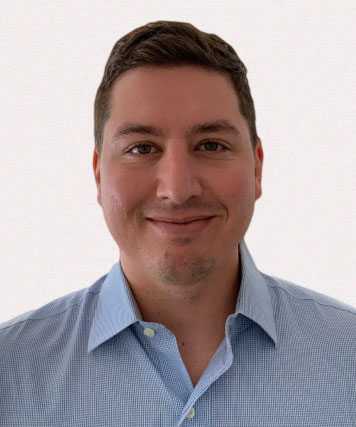Regrowing Hope for Transplant Patients
 Andrew Benintende, MD, has witnessed the tragic consequences when a human body rejects a transplanted organ. His goal is to stop that rejection from happening.
Andrew Benintende, MD, has witnessed the tragic consequences when a human body rejects a transplanted organ. His goal is to stop that rejection from happening.
Dr. Benintende is taking time away from his general surgery residency at Columbia University Irving Medical Center in New York City to perform research at Northwestern University's Feinberg School of Medicine. He is looking to expand his knowledge on how to use a patient’s own cells to grow a replacement for a failing organ. To help find that solution, he turned to Northwestern Engineering’s Master of Biotechnology Program (MBP).
“Transplant patients face life-or-death treatment decisions, and even if they get transplanted, their lifestyle will forever be affected by the immunosuppressive medications they are required to take,” he said. “I ultimately want to find sustainable organ replacement solutions for transplant patients."
When a donated organ is placed in a body different from its original, the new host’s immune system might treat it as a foreign invader, putting the patient’s life in danger. Creating a new functioning organ from the patient’s own cells would solve that problem. Plus, it would lessen the burden on the heavily strained organ donation system – not just in the United States but across the globe.
“This would allow physicians to provide more people with life-saving therapies that don’t significantly alter their lifestyle as well,” Dr. Benintende said.
As part of his research on stem cell therapies and regenerative medicine — specifically in the field of liver transplantation — Dr. Benintende wanted to learn more about bioreactors and biotechnology. That's how he became interested in MBP.
“MBP initially appealed to me because of the harmony between medicine, technology and business,” he said. “I have been so focused on the medicine side of this triad and am now faced with significant biotechnology questions in my research.”
Dr. Benintende's been able to better understand the engineering behind large scale cellular and biologic drug production thanks to MBP. Two of the most impactful courses he's taken so far are Principles of Chemical Engineering and Kinetics, Energetics and Bioreactor Design.
"Those classes are the reason I chose MBP," he said.
After graduating from MBP, Dr. Benintende will return to New York as an attending abdominal transplant surgeon ready to complete the final two years of his residency. He will be a more well-rounded physician and a better researcher when he returns, and for that, he has MBP and the Feinberg School of Medicine to thank.
"MBP brought me into a field that I previously had little knowledge of and experience with," Dr. Benintende said. "It melded medicine, technology, and business in an easy-to-understand fashion. In doing so, it provided a framework for my own professional goals. I ultimately want to find sustainable organ replacement solutions for transplant patients. To do that, I will need to meld medicine, technology, and business to help make that a reality for patients in the future."

